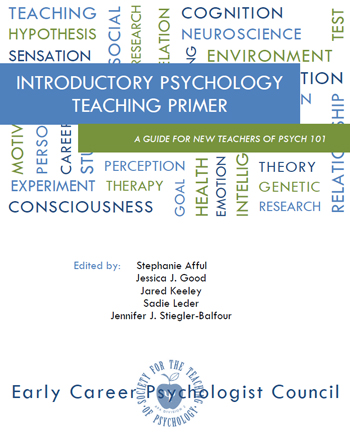- News
- intro2013
Introductory Psychology Teaching Primer: A Guide for New Teachers of Psych 101 |
DescriptionIntroductory psychology is perhaps one of the most difficult courses to teach within the psychology curriculum. Not only does it involve covering the breath of the discipline, something that instructors trained in specific areas are not naturally prepared to do, it also involves teaching students who vary in interests and who lack proficiency in essential skills such as quantitative and informational literacy. Many students take the introductory psychology course primarily to satisfy general education requirements, and only a portion of students carry on to major in psychology. Unlike students in upper level psychology classes, intro students have had little, if any, prior exposure to psychology. Given the importance of the introductory psychology class in American education (approximately 1.7 million students take this class every year) it is perhaps prudent for the premier organization for the teaching of psychology, the Society of the Teaching of Psychology(STP), to provide guidelines for this course and prepare an explicit statement to aid teachers of this course. STP’s Executive Committee charged the Early Career Psychologists group to create a primer to aid those teaching introductory psychology. This document is the result of their labors. ISBN: 978-1-941804-27-8 Download PDF (1.45 Mb) |
Table of Contents
- CHAPTER 1: INTRODUCTION
Regan A. R. Gurung
University of Wisconsin – Green Bay - CHAPTER 2: HISTORY AND CAREERS
Stephanie Afful
Fontbonne University
Jessica J. Good
Davidson College - CHAPTER 3: RESEARCH METHODS
Jessica J. Good
Davidson College - CHAPTER 4: BIOPSYCHOLOGY
Madeline E. Rhodes
McDaniel College - CHAPTER 5: LEARNING
Sara J. Estle
Washington University in St. Louis - CHAPTER 6: MEMORY
Jennifer J. Stiegler-Balfour
University of New England - CHAPTER 7: SENSATION & PERCEPTION
Erika Wells
Union College - CHAPTER 8: CONSCIOUSNESS
Jennifer J. Stiegler-Balfour
University of New England - CHAPTER 9: INTELLIGENCE & THINKING
Jared Keeley
Mississippi State University - CHAPTER 10: DEVELOPMENTAL
Carrie M. Brown
Agnes Scott College - CHAPTER 11: HEALTH, EMOTION, & MOTIVATION
Amanda Whitworth Bequette
Missouri Institute of Mental Health – University of Missouri-St. Louis - CHAPTER 12: PERSONALITY
Sadie Leder
High Point University - CHAPTER 13: SOCIAL
Stephanie Afful
Fontbonne University - CHAPTER 14: ABNORMAL & THERAPY
Jared Keeley
Mississippi State University
Feedback
Feedback regarding the editorial content of this book or any of its essays should be directed toward the individual authors or the book's editors. They (authors and editors) are solely responsible for the substance of the text.
Feedback regarding technical matters of formatting or accessibility of this text via the online environment of the Internet should be directed to the Internet Editor. If you have any complaints or difficulties in accessing these materials, be sure to provide as detailed a description of your problem(s) as you can; you should include information about the browser you are using (e.g., Firefox, Safari) and its version number well as the type of computer you are using and its operating system.
Copyright and Other Legal Notices
The individual essays and chapters contained within this collection are Copyright © 2013 by their respective authors. This collection of essays and chapters as a compendium is Copyright © 2013 Society for the Teaching of Psychology.
You may print multiple copies of these materials for your own personal use, including use in your classes and/or sharing with individual colleagues as long as the author's name and institution, and a notice that the materials were obtained from the website of the Society for the Teaching of Psychology (STP) <http://teachpsych.org/> appear on the copied document. For research and archival purposes, public libraries and libraries at schools, colleges, universities and similar educational institutions may print and store in their research or lending collections multiple copies of this compendium as a whole without seeking further permission of STP (the editors would appreciate receiving a pro forma notice of any such library use). No other permission is granted to you to print, copy, reproduce, or distribute additional copies of these materials. Anyone who wishes to print, copy, reproduce, or distribute copies for other purposes must obtain the permission of the individual copyright owners. Particular care should be taken to seek permission from the respective copyright holder(s) for any commercial or "for profit" use of these materials.
Suggested Reference Format
We suggest that the overall text be referenced in this fashion:
Afful, S. E., Good, J. J., Keeley, J., Leder, S., & Stiegler-Balfour, J. J. (2013). Introductory Psychology teaching primer: A guide for new teachers of Psych 101. Retrieved from the Society for the Teaching of Psychology web site: http://teachpsych.org/ebooks/intro2013/index.php
Individual chapters may be referenced in this fashion:
Good, J. J. (2013). Research methods. In S.E. Afful, J. J. Good, J. Keeley, S. Leder, & J. J. Stiegler-Balfour (Eds.). Introductory Psychology teaching primer: A guide for new teachers of Psych 101. Retrieved from the Society for the Teaching of Psychology web site: http://teachpsych.org/ebooks/intro2013/index.php

